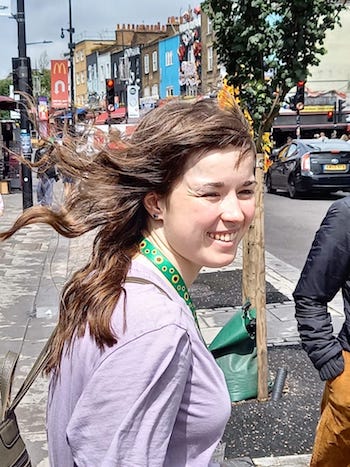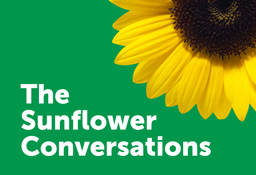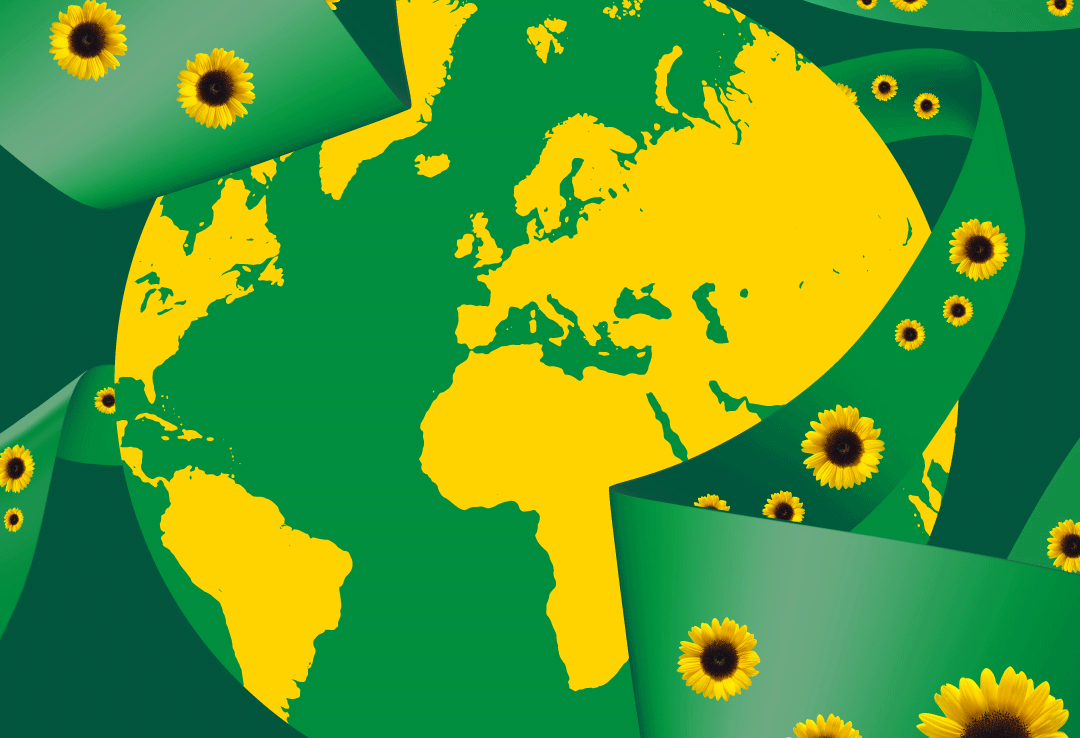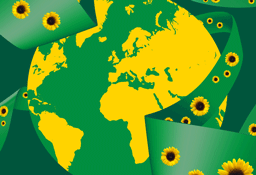So, what to expect from this year? Will our young people get to experience all that university has to offer, and do they indeed want to? Are they looking forward to returning to lectures? Or is there a lot of anxiety over risks to their physical and mental health? We spoke to some of our Sunflower wearing students about their hopes and concerns for their return to campus and how the Sunflower helps them with life at Uni.
Edith
“My name is Edith. I am 19 years old, and I am starting my Second Year at the University of Kent.
I wear a Sunflower lanyard because I have a variety of hidden disabilities that are physical and mental. I am also autistic. The lanyard helps me to discreetly declare to staff members at Uni and other establishments that I may need help, support or more time. I also hope that by wearing the Sunflower lanyard to indicate I have a hidden disability, I will have fewer access issues when it comes to my assistance dog.
I fear returning to Uni with COVID still around as it has worsened my agoraphobia and has meant that I have struggled more than usual. I am also worried that now that masks are no longer mandatory, I will be horrendously anxious to be around anyone. I thrived last year due to my lectures being online. Although I struggled significantly with motivation and executive functioning. Due to not having to leave my house and being able to control my environment, I was better able to focus on my studies.
I have, however, made no friends at all, at Uni, excluding the ones I came to Uni with and have had a lot of difficulty with home life. I am not looking forward to blended learning as that would require being in proximity to people with COVID and being subjected to sounds and smells that may set off my sensory overload. I, however, will have my assistance dog with me, which should hopefully elevate the stress.”
Kieran

Kieran Bhalerao is 21 and reading Human Geography at York St John University.
“I have mixed feelings about returning to my halls of residence at university as students were cited as spreading the virus last autumn. If students mixing is considered to cause a rise in cases, despite me not being a particularly social person, I will have to rely on the behaviour of others, which I have to associate with in Uni, and hope they don't cause me to get ill, despite being double jabbed, by the time I arrive.
I have Asperger’s, which limits my ability to socialise and causes me anxiety. I wear the Sunflower primarily to protect myself from issues I've previously experienced from others during the pandemic, regarding the changes to public spaces to ensure social distancing measures are put in place. Staff have displayed passive-aggressive behaviour towards me, if I made a mistake surrounding the measures, one even threatened to call security on me in the local Tescos because they felt, due to my size, I was going to attack them. I have found people to be more accommodating of me since I started wearing my Sunflower lanyard; however, sadly, it has caused several comments in public from others.
My university recognises the Sunflower, so I hope to feel supported upon my return.”
Kimberley

“ I'm Kimberley, I'm 18, and I'll be entering my first year at University in September to complete a civil engineering degree at Nottingham Trent University. I first started wearing the Sunflower for mask exemption, but now I wear it to make people more aware of my condition (asthma and a thyroid condition).
How do I feel about university this year? I'm quite scared, to be honest, as everything is so uncertain. Uni has been something I've always been so sure about, and I don't want another school year and experience to be taken away from me by COVID.”
Michael
Michael is 20 years old and will be returning for his fourth year of his Masters in Classics at the University of Edinburgh.
“I am most confident about returning to a mixture of online and in-person teaching at university as some things are easier in person, but others are easier online. So, I hope to get the best of both worlds. Discussion in seminars and access to library books is easier when we are on campus. However, I find online teaching easier, as I don't have to plan to be in a certain location at a certain time, and sometimes I find the chat box useful for asking questions when I think of them, rather than waiting for a break in the conversation. As long as people accept that I am exempt from wearing a mask, I think returning will be OK. In terms of what happened last year and students (including me) self-isolating, I am hoping that will happen less this year!
I wear the Sunflower lanyard because I am autistic; therefore, it is the easiest way to say I am exempt from wearing a face covering. Although, I also wear it because people might be a bit more understanding if I am slower in a shop or struggle with anything similar in public.
I don't think my university does recognise the Sunflower as when I have worn it before, to be exempt from wearing a mask, I have had to explain I am exempt (I am autistic and find it stressful to have something touching my face for long periods). However, I think the students' association might be trying to raise awareness of it, based on a post in a Facebook group I am in for disabled students at the University of Edinburgh.”
Jessica

“My name is Jess; I am 19, and I am in the second year of my course, but as I did a foundation year, I am going into my first year now of Primary education studies and am at Chester University.
Despite being locked down in my halls last year, I feel OK about returning to Uni. My Uni recognises the Sunflower, where I picked my lanyard. However, it has taken a little effort to educate them on the meaning of the Sunflower, I had some problems with staff at the beginning, but they are now more understanding.
The pandemic completely changed my whole university experience. From little things like a different freshers and welcome week to the bigger changes in lectures. COVID has definitely made things tougher because no matter how much the Uni and dsa try to help me with my studies, it's still going to be different and, for me, more difficult. Everyone tried their best last year, but there is only so much they could do and still keep us safe.”
It's clear from our Sunflower students that there is much uncertainty and mixed emotions surrounding the return to Uni with the pandemic still rumbling on. So, what are Higher Education providers doing to help ease these concerns? We spoke to Durham and Plymouth University about the role that the Sunflower is playing in their preparations for students returning.
Durham University
“We originally ordered around 1,500 of the Sunflower lanyards at the beginning of the pandemic, to be given out to our staff and students, where required. These were very well received by our community and are now a widely recognised aid.”
The University has worked hard throughout the pandemic, ensuring we remain as Covid safe as possible at all times, and although we appreciate that face coverings are an essential part of this process, we do appreciate that they are not viable for some people. Our aim was obviously to support these people as well and the sunflower lanyards are a great way of doing so.”
Plymouth
“In line with Government advice, members of the public (including those attending work or higher education) are asked to wear face coverings in certain indoor settings to limit the spread of COVID-19. Some groups of people are, however, exempt from wearing a face covering. The Sunflower lanyard scheme has offered students and staff a discrete and respectful way to indicate to others that they have a disability without having to broadcast the fact or make specific arrangements at a venue. With COVID19 restrictions in place over much of the last 18 months, and not all disabilities being visible, it has allowed people to quietly indicate that they may be exempt from some measures (such as face coverings), without drawing attention to themselves, or risking the discomfort of being challenged by others. The University supports the Sunflower scheme, and lanyards are available at campus venues. Key staff are trained to recognise the lanyard, and there is a broad awareness of the scheme. Although the scheme has gained traction and uptake during the current COVID crisis, the benefits to its participants extend beyond this.”
The current Government guidance for Higher Education providers can be found here.
Universities that recognise the Sunflower
With students going back to Campus, either as freshers or returning to their studies, here is a list of schools, Universities and Colleges that recognise the Hidden Disabilities Sunflower. Each of these has trained its staff to identify and understand the meaning of the Sunflower and offer any support or understanding that the wearer might need.





